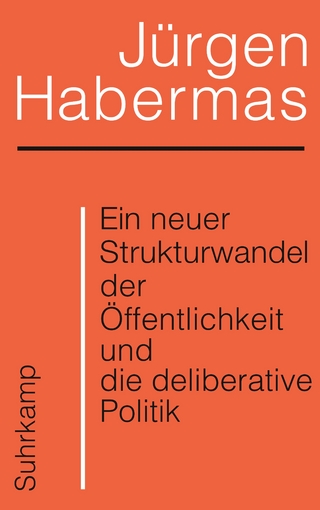
The Ruse of Techne
Fordham University Press (Verlag)
978-1-5315-0674-2 (ISBN)
- Noch nicht erschienen (ca. September 2024)
- Versandkostenfrei innerhalb Deutschlands
- Auch auf Rechnung
- Verfügbarkeit in der Filiale vor Ort prüfen
- Artikel merken
By unearthing the source of the conception of non-instrumental action in Heidegger’s reading of Aristotle, Vardoulakis elaborates how it forms part of Heidegger’s response to an old problem, namely, how to account for difference after positing a single and unified being that is not amenable to change. He further demonstrates that an action without ends and effects leads to an ethics and politics rife with difficulties and contradictions that only become starker when compared to other responses to the same problem that we find in the philosophical tradition and which rely on instrumentality.
Heidegger’s conception of an action without ends or effect forgets the role of instrumentality in the tradition that posits a single, unified being. And yet, the ineffectual has had a profound influence in how continental philosophy determines the ethical and the political since World War II. The critique of the ineffectual in Heidegger is thus effectively a critique of the conception of praxis in continental philosophy. Vardoulakis proposes that it is urgent to undo the forgetting of instrumentality if we are to conceive of a democratic politics and an ethics fit to respond to the challenges of high capitalism.
Dimitris Vardoulakis is Professor of Philosophy at Western Sydney University. He is the author of Spinoza, the Epicurean: Authority and Utility in Materialism (2020), Stasis Before the State: Nine Thesis on Agonistic Democracy (2018), Freedom from the Free Will: On Kafka’s Laughter (2016), Sovereignty and its Other: Toward the Dejustification of Violence (2013), and The Doppelgänger: Literature’s Philosophy (2010).
Exordium
Acknowledgements
Preamble:
The Ineffectual and the Instrumental
1. The ineffectual
2. The instrumental
1. Introduction:
What is the Ruse of Techne?
3. The ruse of techne
4. Metaphysical materialism (the metaphysics of morals)
5. The reception of Heidegger and the ruse of techne
6. The repression of instrumentality
7. The underground current of a materialism of instrumentality
8. Effects of the ruse of techne (or, why the repression of instrumentality still matters today)
9. On method
2. The Problematic of Action within a Single, Unified Being:
Monism in Heidegger’s Thought
10. Heidegger’s other path
11. The first problem: How to be a different materialist?
12. The second problem: How is action possible within a monist ontology?
13. The third problem: Can monism provide qualitative distinctions between actions?
14. Two kinds of monist materialism
15. Two historical difficulties arising from Heidegger’s solution to the problematic of action in monism
16. The double bind of the repression of instrumentality: Between the vacuous and the self-contradictory
17. Why Heidegger’s solution to the problematic of action in monism matters
3. The Conflation of Causality and Instrumentality:
Phronesis and the Genesis of the Ruse of Techne
18. Heidegger’s bildungsroman
19. The truth of phronesis as the combination of calculation, emotion and situatedness
20. The two ends of action in Aristotle (Nicomachean Ethics 1139a)
21. Techne and phronesis distinguished through their ends
22. The distinction between final and instrumental ends and the problematic of action in monism
23. A Greek hating philhellene
24. The context of Heidegger’s interpretation of phronesis
25. Heidegger’s mistranslations of the hou heneka
26. Heidegger’ contrast between hou heneka and heneka tinos: The repression of instrumentality
27. The genesis of the ruse of techne: sophia as the virtue of techne
28. Teleocracy
29. Phronesis, resoluteness and temporality: The “either/or”
Excursus:
Through the Looking Glass of the Distinction between Causality and Instrumentality
30. Acting and the other: The politics of instrumentality
31. The repression of instrumentality in metaphysics
32. Causal and instrumental ends in monist materialism
4. The Concealment of Instrumentality:
The Conception of Action in Being and Time
33. The reason for focusing on the examples of action in Being and Time
34. The epigraph and the problem of action in the Sophist
35. Destruction and monism
36. Inauthentic, indifferent, and authentic action
37. Hammering and the concealing of instrumentality (Being and Time §15)
38. The breakdown of ends (Being and Time §16)
39. Sign and reference, understanding and interpretation (Being and Time §17)
40. Dictatorship
41. The temporality of death and the myth of Care
42. Techne as the virtue of theory
43. Subjectum absconditum
5. The Ontology of Conflict:
Conjuring Authority
44. The “turn” and action
45. Authority as the means to repress instrumentality
46. Conflict and the three senses of techne
47. The subjectivism authority (Prometheus)
48. The problem of the metaphysico-political conflict
49. The historical decision and phusis (Oedipus Rex)
50. Apolis and the spontaneous creation of authority (Antigone 1)
51. The human as deinon and the repression of instrumentality (Antigone 2)
52. A politics without reaction or an agonistic politics
53. The preservers and the magical founding of the city
6. The Ontology of the Ineffectual:
The Purloined Letter of Instrumentality
54. The reversal of the critique of monism
55. The turn, the return, and the other turn (the critique of Sartre as self-critique)
56. Transformations of the ruse of techne
57. Instrumentality incorporated into causality (the first sense of techne)
58. The ambivalence of the calculable and enframing (the second sense of techne)
59. The killing power of the saving power (the third sense of techne)
60. Metaphysical or materialist monism?
61. The French appropriation of the repression of instrumentality
62. The new Kantianism
63. Technophobia and the repression of instrumentality
64. The paradox of the final end
Peroratio
Bibliography
| Erscheint lt. Verlag | 3.9.2024 |
|---|---|
| Reihe/Serie | Perspectives in Continental Philosophy |
| Verlagsort | New York |
| Sprache | englisch |
| Maße | 152 x 229 mm |
| Themenwelt | Geisteswissenschaften ► Philosophie ► Philosophie der Neuzeit |
| Geisteswissenschaften ► Sprach- / Literaturwissenschaft ► Anglistik / Amerikanistik | |
| Geisteswissenschaften ► Sprach- / Literaturwissenschaft ► Literaturwissenschaft | |
| Sozialwissenschaften ► Politik / Verwaltung ► Politische Theorie | |
| ISBN-10 | 1-5315-0674-7 / 1531506747 |
| ISBN-13 | 978-1-5315-0674-2 / 9781531506742 |
| Zustand | Neuware |
| Haben Sie eine Frage zum Produkt? |
aus dem Bereich


